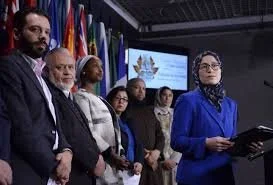British tabloids were ruthless to Meghan Markle — will Canadian media learn from their mistakes? Global News
Prince Harry and Meghan Markle have spoken openly about the ruthless, exploitative and dangerous nature of the British press.
The couple has even sued British tabloids over their “continual misrepresentations,” and Markle admitted she’s struggled with the intense media scrutiny since marrying into the Royal Family.
“I never thought that this would be easy, but I thought it would be fair,” she said in a 2019 documentary.
The Duke and Duchess of Sussex recently revealed their plan to step away from senior royal duties and split their time between Canada and the U.K. as they work to become financially independent.
But will Canadian reporters better respect their privacy and cover them in a different way than the U.K. press has? According to experts, the country’s media landscape is likely a factor in why the royal couple picked Canada.
“[Canada] is a completely different environment, and that is possibly something that Meghan observed when she lived here before,” said Janice Neil, chair of the school of journalism at Ryerson University in Toronto. Neil previously worked as a reporter in the U.K.
There’s a huge portion of the U.K. media industry that’s based on “salacious gossip,” Neil said, and Canada doesn’t have that to the same degree.
“[The country] has shockingly learned nothing from a couple decades of criticism … starting with how [they chased] Princess Diana,” she said.
Markle and Prince Harry’s relationship with the U.K. press
Prince Harry has a notoriously strained relationship with the press, as his mother, Princess Diana, died in a car crash after being chased by paparazzi.
The prince has said he feared “history repeating itself.”
“I lost my mother and now I watch my wife falling victim to the same powerful forces,” he said.
Queen confirms Harry and Meghan will live part-time in Canada
What’s more, Markle has experienced racism in the U.K. as a biracial member of the Royal Family.
In a recent Washington Post op-ed, author Yomi Adegoke wrote that British tabloids were “committed not to news but the distortion of [Markle’s] image” in their coverage.
“British racism is often coy and coded, but when it comes to Meghan there was no need to read between the lines,” Adegoke wrote.
“The hate was in the headlines, which referred to the Los Angeles neighbourhood where she grew up as ‘gang-scarred‘ and her role editing a racially diverse edition of Vogue as ‘divisive.'”
The Daily Show host Trevor Noah even pointed out the racism Markle endured in the British press on Monday, comparing headlines about Kate Middleton and Markle.
Noah gave the example of when Middleton was reportedly “gifted” avocados during pregnancy to “cure” morning sickness, while Markle’s avocado habit was linked to “human rights abuse and drought.”
Canada is more progressive than the U.K. when it comes to race, said journalist and human rights advocate Amira Elghawaby, but the country still has some work to do.
Elghawaby said there is still potential for racist coverage of Markle, as many Canadian newsrooms do not reflect the diversity of the country.
“They won’t be fully immune from that here in Canada, but it certainly won’t be as toxic as the culture in the U.K.,” she said.
A chance for Canadian media to prove itself
With Markle and Prince Harry living in Canada, it will take time to see how local outlets cover their day-to-day lives.
Neil believes “tight news budgets” at major Canadian news organizations could allow Markle and Prince Harry to live a more private life.
Private security expert says protection for Prince Harry, Meghan Markle ‘could cost millions’
“If you start having people covering the royals … what are they not going to cover [instead]?” she said.
“Already, many provinces in this country don’t have reporters at the provincial legislature — and many cities don’t have city reporters.”
Elghawaby said it is tough to predict how people will treat the couple — especially Markle — on social media. She pointed to other women of colour in public positions, including former governors general of Canada Michaelle Jean and Adrienne Clarkson.
“They were not exposed to such racism as Meghan has been experiencing, and they were representatives of the Crown,” Elghawaby said.
“But those women were there before social media, and things are evolving. It’s not like it can’t become toxic on social media.”
Elghawaby also wonders if the couple’s move could prompt the creation of new Canadian tabloids.
She said that because media is a business, a growing interest in Markle and Prince Harry could open up new revenue opportunities.
“If it becomes apparent that doing stories about the couple brings more clicks… the question becomes will media in Canada start shifting? Or will we see the emergence of new media businesses emerging to cover the couple?” she said.
Still, it is important Canadian media treats Markle with respect and does not engage in racist coverage.
“Many people are in denial in this country about how racism plays a daily role in many communities,” Elghawaby said.
